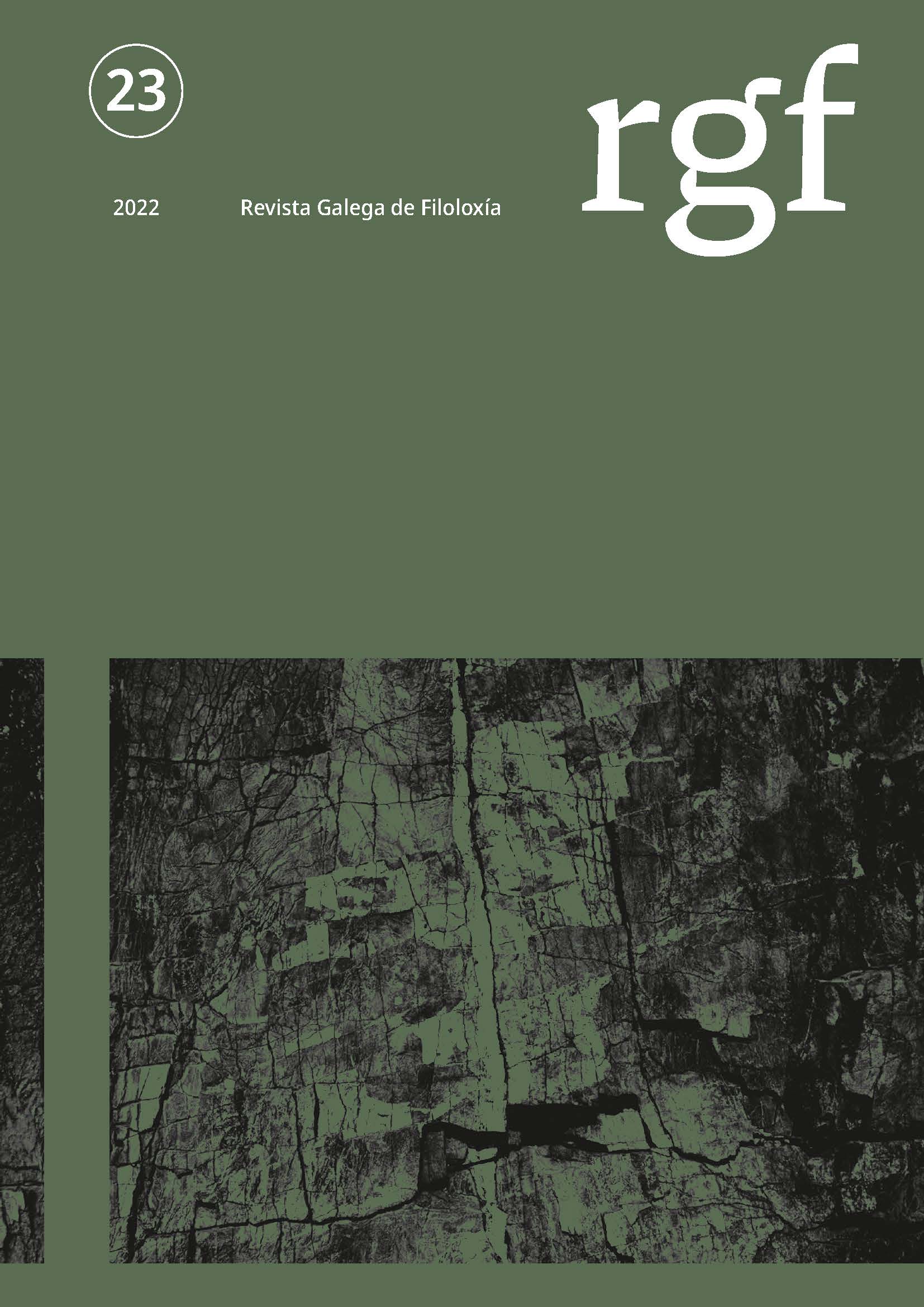Galician literature in English? Some thoughts on exophony, literary systems and Jacobo Priegue’s novel The Out-cast Child
Main Article Content
Abstract
This article analyses Jacobo Priegue’s The Outcast Child, a novel written in English by a first-generation Galician migrant author in the United Kingdom. This is a unique case of exophonic writing that should be considered within Galician Studies and in which the transterritorialisation of the characters add interest to a text produced in a foreign language by a member of the new Galician diaspora. Despite it being a crime fiction with some psychological characteristics, the text exemplifies the interesting existing dichotomy between the host country and the home country of both the protagonist and the author when dealing with latent traumas. The Outcast Child, although it is a unique case, will be utilised to point out some thoughts on exophony, canon and the way in which the new Galician diaspora is contributing to Galician Studies with texts written in a foreign language.
Keywords:
Downloads
Metrics
Article Details
References
Alonso Alonso, María (2021). Alén. Santiago de Compostela: Bolanda.
Álvarez, Rosario (2015). “Lingua galega: entre a identidade e a mundialización”. En Castro, Olga, & Liñeira, María (eds.), Trama e urda. Contribucións multidisciplinares desde os estudos galegos, 15-44. Santiago de Compostela: Consello da Cultura Galega.
Ashcroft, Bill, Gareth Griffiths & Helen Tiffin (1989). The Empire Writes Back: Theory and practice in post-colonial literatures. Londres e Nova York: Routledge.
Avelar, Idelber (2009). “La contrucción del canon y la cuestión del valor literario”, Aisthesis, 46, 213-21.
Bhabha, Homi K. (1995). The Location of Culture. Londres / Nova York: Routledge.
Birch, Dinah (ed.) (2009). The Oxford Companion to English Literature, 7th edition. Oxford / Nova York: Oxford University Press.
Brathwaite, Edward K. (1990). “History, the Caribbean Writer and X/Self”. En Davis, Geoffrey V., & Maes-Jelinek, Hena (eds.), Crisis and Creativity in the New Literatures in English, 23-45. Amsterdam / Nova York: Rodopi.
Carballo Calero, Ricardo (1981) [1962]. Historia da literatura galega contemporánea: 1808 – 1936). Vigo: Galaxia.
De Palma, Renée, & Pérez-Caramés, Antía (eds.) (2018). Galician Migrations: A Case Study of Emerging Super-diversity. Cham: Springer.
Deyanova, Gabriela (2018). “Jacobo Priegue: ‘La clave está en sentarse y teclear, no esperar a que llegue la ins-piración”, El Ibérico. El periódico español del Reino Unido. Dispoñíbel en https://www.eliberico.com/jacobo-prie-gue-la-clave-esta-en-sentarse-y-teclear-no-esperar-a-que-llegue-la-inspiracion/ (Consultado en 17.06.2021).
Edwards, Justin (2008). Postcolonial Literature: A reader’s guide to essential criticism. Basingstoke: Palgrave.
Even-Zohar, Itamar (ed.) (1990). “Polysystem Studies”, Poetics Today, 11/1, 1-262.
Figueiredo, Anna R. (2018). Os bicos feridos. Vigo: Galaxia.
Figueroa, Antón (1991). “La lectura en el otro espacio”. En Lafarga Maduell, Francisco, & Donaire Fernández María Luísa (eds.), Traducción y adaptación cultural: España-Francia, 21-30. Oviedo: Universidad de Oviedo.
Figueroa, Antón (2001). Nación, literatura, identidade: comunicación literaria e campos sociais en Galicia. Vigo: Xerais.
Forcadela, Manuel (2017). “Literatura nacional, literatura mundial. Literatura universal, literatura globalizada”. En Requeixo Cuba, Armando (ed.), Sobre letras e signos: estudos en homenaxe a Anxo Tarrío Varela, 367-84. San-tiago de Compostela: Xunta de Galicia.
González Millán, Xoán (1998). “A reconfiguración do espacio literario galego actual: Transformacións e desa-fíos”. En Vieites, Manuel F. (ed.), Do novo teatro á nova dramaturxia (1965-1995), 15-32. Vigo: Xerais.
González Millán, Xoán (2001). “Os problemas dunha lectura (poli)sistémica da literatura”. En Lozano-Renieblas, Isabel, & Mercado, Juan Carlos (coords.), Silva. Studia philologica in honorem Isaías Lerner, 301-13. Madrid: Editorial Castalia.
Hall, Stuart (1992). “The West and the Rest: Discourse and Power”. En Gupta, Tania das, James, Carl E., Maaka, Roger C. A., Galabuzi, Grace-Edward, & Andersen Chris (eds.), Race and Racialization: Essential Readings, 56-60. Toronto: Canadian Scholar’s Press.
Liñeira, María (2015). “Something in Between: Galician Literary Studies Beyond the Linguistic Criterion”, Abriu, 4, 77-88.
Lourido, Isaac, &, Martínez Tejero, Cristina (2017). “Modelos de compromisso no campo dos estudos literários galegos”. En López, Teresa, Malingret, Laurence, & Torres Feijó, Elias J. (eds.), Estudos literarios e campo cultural galego, 155-164. Santiago de Compostela: Universidade de Santiago de Compostela.
Madsen, Deborah L. (2000). Understanding Contemporary Chicana Literature. Columbia: University of South Carolina Press.
Moreda, Eva (2020). Para toda a vida. Allariz: Aira Editorial.
Polloch, Griselda (2007). “Daydreaming Before History: The Last Works of Signmund Freud and Charlotte Salomon”. En Durrant, Sam, & Lord, Catherine S. (eds.), Essays in Migratory Aesthetics: Cultural Practices between Migration and Art-Making, 205-28. Amsterdam / Nova York: Rodopi.
Pozuelo Yvancos, José María & Rodríguez Alonso, Mariángeles (2021). “Veinte años de teoría: canon, pensamiento literario e historiografía”, Theory Now: Journal of Literature, Critique and Thought, 4/1, 6-21.
Priegue, Jacobo (2019). The Outcast Child. London: Amazon.
Roussel, Flora (2020). “Nomadic Subjectivities: Reflections on Exophonic Strategies in Yoko Tawada’s Schwager in Bordeaux”, Humanities Bulletin, 3/1, 161-178.
Said, Edward (1995) [1978]. Orientalism. Londres: Penguin.
Ventura Ruiz, Joaquim (2006). “Libros y autores gallegos en un canon literario europeo”, Mil Seiscientos Dieciséis, XI, 189-96.
Whitehead, Anne (2004). Trauma Fiction. Edimburgo: Edinburgh University Press. Wright, Chantal (2008). “Writing in the ‘Grey Zone’: Exophonic Literarure in Contemporary Germany”, gfl-journal, 3, 26-42.



